
In 2001, when the Intergovernmental Panel on Climate Change produced its third set of reports examining the causes and consequences of global warming, it included a fascinating illustration, called the “burning embers” diagram, showing gradients of rising risk with rising temperatures.
It was part of the panel’s evolving effort to provide policymakers with a clear sense of what was known about potential impacts from various levels of warming and also what was uncertain.
An updated version of the diagram was created for the panel’s momentous 2007 report on climate, but it met resistance from some scientists who thought the color bars were too vague or subjective and from some governments, which thought the artwork was too unnerving, according to interviews with the lead authors. More >>>






